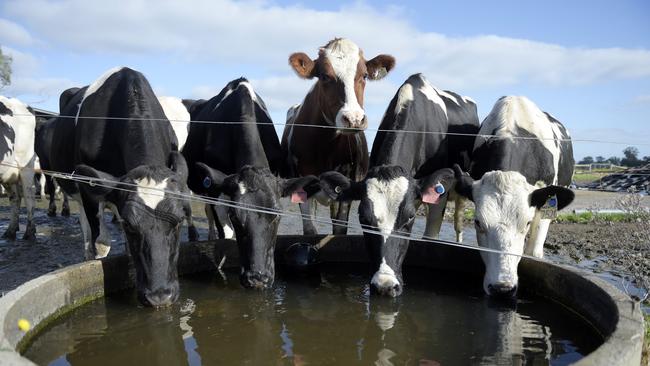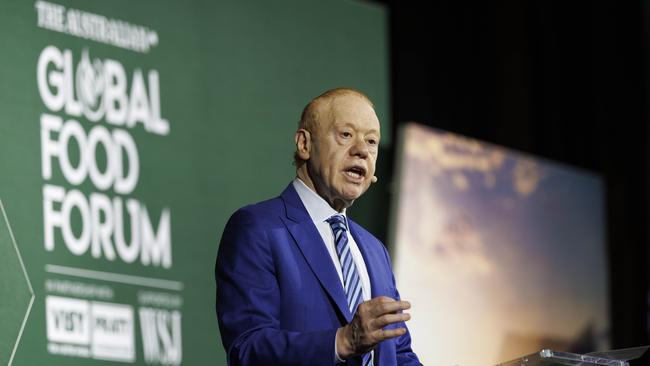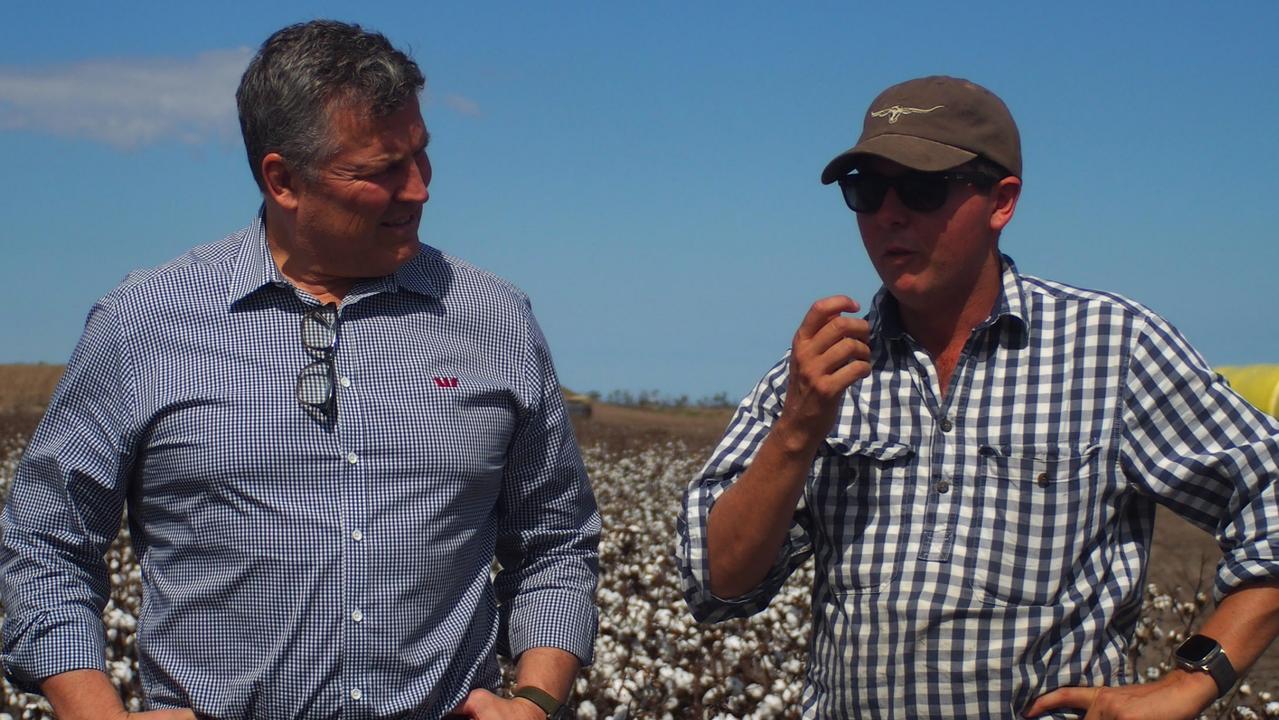Visy supremo applauds nation’s progress towards $100bn of food exports
Two years ago, billionaire Anthony Pratt said Australia should set a short-term goal of $100bn in food exports and thanks to free-trade agreements and global supply disruptions we’re on the way.

Billionaire paper, packaging and recycling magnate Anthony Pratt has lauded Australia’s rapid advance towards $100bn in annual food exports, as a free-trade agreements and global supply disruptions have driven soaring demand for Australian products in overseas markets.
Two years ago Mr Pratt called on Australians to set a short-term goal of reaching $100bn in annual food exports and last financial year the nation sold $75.6bn worth of agriculture, fishery and forestry products in overseas markets, as exports of livestock and livestock products reached a record $29bn.
While this was slightly down from the record high of $80.4bn achieved in the previous financial year, Australia’s food exports have more than doubled over the past 12 years and most importantly, are now growing strongly into India, South America and the fast-growing economies in the Association of Southeast Asian Nations (ASEAN).
“We are diversifying into new international markets with 70 per cent of our farmed production being sold to 169 markets,” Mr Pratt will tell The Australian and Visy Group’s 13th annual Global Food Forum in Melbourne on Friday.
“For example, skim milk powder exports were previously mainly going to China. Now we have seen a 70 per cent increase to Indonesia in just one year. Last year’s exports of two million tonnes of red meat went to 104 countries … It is gratifying to be able to present this report card.”
Australian beef exports, a key commodity in the country’s $94bn agricultural, fishery and forestry industry, last year rose 24 per cent from a year earlier, according to data from the Department of Agriculture.
In 2024, the majority of Australia’s red meat exports were directed to markets where trade agreements have been secured.
“Free trade agreements or FTAs have been a critical part our export success – they are the oil in the cogs of the engine of international trade,” Mr Pratt will say.
“Seventy per cent of Australia’s 19 FTAs have been achieved since we started the Global Food Forum, and Trade Minister Don Farrell signed the latest one with the United Arab Emirates last year.”

The UAE deal eliminates tariffs on more than 99 per cent of all Australian products entering the Middle Eastern kingdom. A major benefit of the agreement is the elimination of the 5 per cent import tariff on frozen red meat.
Under Australia’s FTA with Britain, concluded in 2023, tariffs on wine, short and medium grain rice, honey, olive oil and nuts have been eliminated and duty-free transitional quotas for beef, sheep meat and sugar are already benefiting farming communities.
“Ninety-five per cent of last year’s record red meat exports went to FTA countries, including a 44 per cent increase in Australian lamb exports to the UK because of the Australia-UK FTA,” Mr Pratt will say.
Australian farmers are also making a big push into India as an alternative market to China, with a 50 per cent jump in agricultural exports since the landmark Australia-India Economic Co-operation and Trade Agreement (ECTA) came into force last year.
India surpassed China as the world’s most populous country in 2023 and since the ECTA came into force – eliminating tariffs on 85 per cent of Australian goods – exports of Australian sheep meat, seafood, broad beans, avocados, citrus and almonds have grown strongly.
But China is Australia’s largest single export market and the reopening of that market to Australian wine producers last year has also led to a boost for the wine grape industry, which increased exports over 2024 by $100m.
The boom in exports comes as the total value of Australian agricultural production is expected to hit the second highest level on record this financial year, putting the industry on track to meet its target of $100bn by 2030.
Modelling released by the federal government has forecast that agricultural production will rise in value by $6bn to $88.4bn in 2024-25, a figure eclipsed only by the $94.37bn posted in 2022-23.
“The Global Food Forum is about growing Australia’s farming and food manufacturing sector by investing to add value to what we produce and multiplying jobs across Australia, especially in the regions,” Mr Pratt will say, before pointing to big increases in the production of high-value foods like avocados, mangoes, meat and dairy.
“When we started the GFF 12 years ago the food industry wasn’t getting the attention it deserved.
“Today the turnover of farming and food manufacturing is $250bn, $92bn more than when we began the GFF, providing 600,000 jobs across farming and food production. That makes food the biggest and fastest-growing part of the economy.”
In his GFF speech, Mr Pratt will also point to record investment in food manufacturing over the past decade.
“There are 1400 more food and beverage factories in Australia now than when we started, paying $18bn a year of wages to Australian workers, many in regional areas,” he will say.
Established in Melbourne in 1948, the Pratt family’s Visy Group today employs more than 10,000 people across its Australian and US operations, where it is known as Pratt Industries USA. Seventy per cent of its customers are in the food and beverage sector. As a result the company has long held a passion for reducing food waste, which Mr Pratt has previously called “our nation’s hidden crisis’’. More than 7.6 million tonnes of food is wasted each year, costing the Australian economy around $36.6bn annually.
As a result the federal government has launched “Australia’s National Food Waste Strategy”, aiming to halve waste by 2030.
While Mr Pratt will praise the nation’s food and beverage companies for their work at reducing food waste and boosting recycling, he believes more needs to be done.
“Eliminating food waste is one of the most effective way to eliminate world hunger,” he will tell the forum.
“If food waste were a country it would be the third-largest emitter of greenhouse gases because food rotting in landfills emits methane gas which is 84 times worse than CO2. It is also one of the most practical ways every person can make to tackle climate change.”




To join the conversation, please log in. Don't have an account? Register
Join the conversation, you are commenting as Logout